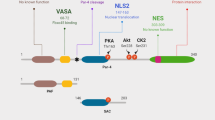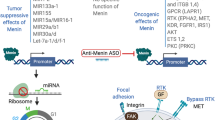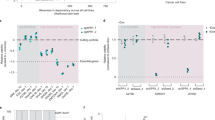Abstract
Tumor drug resistance remains a major challenge in the treatment of cancer. Here, we show that Prostatic secretory protein 94 (PSP94) levels are reduced in ovarian cancer patients with high levels of excision repair cross-complementing 1 (ERCC1), a marker for chemoresistance. We find that PSP94 is decreased in an ovarian cancer drug-resistant cell line, and plays an important role in the development of drug resistance in vitro. Our studies indicate that PSP94 can partially reverse drug resistance in mouse tumor models in vivo and that a PSP94 peptide derivative PCK3145 suppresses chemoresistant cancer cell and tumor growth in vitro and in vivo. Our investigation of the involved molecular mechanisms suggests that PSP94 may confer drug resistance by modulating the Lin28b/Let-7 signaling pathway. We introduce PSP94 and its peptide derivative PCK3145 as potential target to reverse chemoresistance in ovarian cancer and have begun to identify their relevant molecular targets in specific signaling pathways.
This is a preview of subscription content, access via your institution
Access options
Subscribe to this journal
Receive 50 print issues and online access
$259.00 per year
only $5.18 per issue
Buy this article
- Purchase on Springer Link
- Instant access to full article PDF
Prices may be subject to local taxes which are calculated during checkout





Similar content being viewed by others
References
Longley DB, Johnston PG . Molecular mechanisms of drug resistance. J Pathol 2005; 205: 275–292.
Redmond KM, Wilson TR, Johnston PG, Longley DB . Resistance mechanisms to cancer chemotherapy. Front Biosci 2008; 13: 5138–5154.
Sharma SV, Lee DY, Li B, Quinlan MP, Takahashi F, Maheswaran S et al. A chromatin-mediated reversible drug-tolerant state in cancer cell subpopulations. Cell 2010; 141: 69–80.
Berns K, Horlings HM, Hennessy BT, Madiredjo M, Hijmans EM, Beelen K et al. A functional genetic approach identifies the PI3K pathway as a major determinant of trastuzumab resistance in breast cancer. Cancer Cell 2007; 12: 395–402.
Honma K, Iwao-Koizumi K, Takeshita F, Yamamoto Y, Yoshida T, Nishio K et al. RPN2 gene confers docetaxel resistance in breast cancer. Nat Med 2008; 14: 939–948.
Yeung J, Esposito MT, Gandillet A, Zeisig BB, Griessinger E, Bonnet D et al. beta-Catenin mediates the establishment and drug resistance of MLL leukemic stem cells. Cancer Cell 2010; 18: 606–618.
Chen T . Overcoming drug resistance by regulating nuclear receptors. Adv Drug Deliv Rev 2010; 62: 1257–1264.
Lage H . An overview of cancer multidrug resistance: a still unsolved problem. Cell Mol Life Sci 2008; 65: 3145–3167.
Lilja H, Abrahamsson PA . Three predominant proteins secreted by the human prostate gland. Prostate 1988; 12: 29–38.
Weiber H, Andersson C, Murne A, Rannevik G, Lindstrom C, Lilja H et al. Beta microseminoprotein is not a prostate-specific protein. Its identification in mucous glands and secretions. Am J Pathol 1990; 137: 593–603.
Baijal-Gupta M, Clarke MW, Finkelman MA, McLachlin CM, Han VK . Prostatic secretory protein (PSP94) expression in human female reproductive tissues, breast and in endometrial cancer cell lines. J Endocrinol 2000; 165: 425–433.
Whitaker HC, Warren AY, Eeles R, Kote-Jarai Z, Neal DE . The potential value of microseminoprotein-beta as a prostate cancer biomarker and therapeutic target. Prostate 2010; 70: 333–340.
Yi Guo BY, Mueller Michael D, Jie Yu Jing . The PSP94→prostasin pathway and early detection of ovarian cancer. AACR (Am Assoc Cancer Res) Annu Meet 2012; 53: abstract 3644.
Bussing I, Slack FJ, Grosshans H . let-7 microRNAs in development, stem cells and cancer. Trends Mol Med 2008; 14: 400–409.
Schickel R, Boyerinas B, Park SM, Peter ME . MicroRNAs: key players in the immune system, differentiation, tumorigenesis and cell death. Oncogene 2008; 27: 5959–5974.
Pasquinelli AE, Reinhart BJ, Slack F, Martindale MQ, Kuroda MI, Maller B et al. Conservation of the sequence and temporal expression of let-7 heterochronic regulatory RNA. Nature 2000; 408: 86–89.
Boyerinas B, Park SM, Hau A, Murmann AE, Peter ME . The role of let-7 in cell differentiation and cancer. Endocr Relat Cancer 2010; 17: F19–F36.
Piskounova E, Polytarchou C, Thornton JE, LaPierre RJ, Pothoulakis C, Hagan JP et al. Lin28A and Lin28B inhibit let-7 microRNA biogenesis by distinct mechanisms. Cell 2011; 147: 1066–1079.
Viswanathan SR, Daley GQ, Gregory RI . Selective blockade of microRNA processing by Lin28. Science 2008; 320: 97–100.
Guo Y, Chen Y, Ito H, Watanabe A, Ge X, Kodama T et al. Identification and characterization of lin-28 homolog B (LIN28B) in human hepatocellular carcinoma. Gene 2006; 384: 51–61.
Viswanathan SR, Powers JT, Einhorn W, Hoshida Y, Ng TL, Toffanin S et al. Lin28 promotes transformation and is associated with advanced human malignancies. Nat Genet 2009; 41: 843–848.
King CE, Wang L, Winograd R, Madison BB, Mongroo PS, Johnstone CN et al. LIN28B fosters colon cancer migration, invasion and transformation through let-7-dependent and -independent mechanisms. Oncogene 2011; 30: 4185–4193.
Hagan JP, Piskounova E, Gregory RI . Lin28 recruits the TUTase Zcchc11 to inhibit let-7 maturation in mouse embryonic stem cells. Nat Struct Mol Biol 2009; 16: 1021–1025.
Ji J, Wang XW . A Yin-Yang balancing act of the lin28/let-7 link in tumorigenesis. J Hepatol 2010; 53: 974–975.
Dabholkar M, Vionnet J, Bostick-Bruton F, Yu JJ, Reed E, Messenger RNA . levels of XPAC and ERCC1 in ovarian cancer tissue correlate with response to platinum-based chemotherapy. J Clin Invest 1994; 94: 703–708.
Li Q, Yu JJ, Mu C, Yunmbam MK, Slavsky D, Cross CL et al. Association between the level of ERCC-1 expression and the repair of cisplatin-induced DNA damage in human ovarian cancer cells. Anticancer Res 2000; 20: 645–652.
Olaussen KA, Mountzios G, Soria JC . ERCC1 as a risk stratifier in platinum-based chemotherapy for nonsmall-cell lung cancer. Curr Opin Pulm Med 2007; 13: 284–289.
Rabik CA, Dolan ME . Molecular mechanisms of resistance and toxicity associated with platinating agents. Cancer Treat Rev 2007; 33: 9–23.
Reed E, Yu JJ, Davies A, Gannon J, Armentrout SL . Clear cell tumors have higher mRNA levels of ERCC1 and XPB than other histological types of epithelial ovarian cancer. Clin Cancer Res 2003; 9: 5299–5305.
Shukeir N, Arakelian A, Kadhim S, Garde S, Rabbani SA . Prostate secretory protein PSP-94 decreases tumor growth and hypercalcemia of malignancy in a syngenic in vivo model of prostate cancer. Cancer Res 2003; 63: 2072–2078.
Shukeir N, Arakelian A, Chen G, Garde S, Ruiz M, Panchal C et al. A synthetic 15-mer peptide (PCK3145) derived from prostate secretory protein can reduce tumor growth, experimental skeletal metastases, and malignancy-associated hypercalcemia. Cancer Res 2004; 64: 5370–5377.
Fuchtner C, Emma DA, Manetta A, Gamboa G, Bernstein R, Liao SY . Characterization of a human ovarian carcinoma cell line: UCI 101. Gynecol Oncol 1993; 48: 203–209.
Garofalo M, Romano G, Di Leva G, Nuovo G, Jeon YJ, Ngankeu A et al. EGFR and MET receptor tyrosine kinase-altered microRNA expression induces tumorigenesis and gefitinib resistance in lung cancers. Nat Med 2012; 18: 74–82.
Bitarte N, Bandres E, Boni V, Zarate R, Rodriguez J, Gonzalez-Huarriz M et al. MicroRNA-451 is involved in the self-renewal, tumorigenicity, and chemoresistance of colorectal cancer stem cells. Stem Cells 2011; 29: 1661–1671.
Chang TC, Zeitels LR, Hwang HW, Chivukula RR, Wentzel EA, Dews M et al. Lin-28B transactivation is necessary for Myc-mediated let-7 repression and proliferation. Proc Natl Acad Sci USA 2009; 106: 3384–3389.
Chan PS, Chan LW, Xuan JW, Chin JL, Choi HL, Chan FL . In situ hybridization study of PSP94 (prostatic secretory protein of 94 amino acids) expression in human prostates. Prostate 1999; 41: 99–109.
Abrahamsson PA, Lilja H . Three predominant prostatic proteins. Andrologia 1990; 22: 122–131.
Xuan JW, Chin JL, Guo Y, Chambers AF, Finkelman MA, Clarke MW . Alternative splicing of PSP94 (prostatic secretory protein of 94 amino acids) mRNA in prostate tissue. Oncogene 1995; 11: 1041–1047.
Hawkins RE, Daigneault L, Cowan R, Griffiths R, Panchal C, Armstrong A et al. Safety and tolerability of PCK3145, a synthetic peptide derived from prostate secretory protein 94 (PSP94) in metastatic hormone-refractory prostate cancer. Clin Prostate Cancer 2005; 4: 91–99.
Jeong SH, Wu HG, Park WY . LIN28B confers radio-resistance through the posttranscriptional control of KRAS. Exp Mol Med 2009; 41: 912–918.
Pardoll DM . The blockade of immune checkpoints in cancer immunotherapy. Nat Rev Cancer 2012; 12: 252–264.
Lv K, Liu L, Wang L, Yu J, Liu X, Cheng Y et al. Lin28 Mediates Paclitaxel Resistance by Modulating p21, Rb and Let-7a miRNA in Breast Cancer Cells. PLoS One 2012; 7: e40008.
Yu J, Dabholkar M, Bennett W, Welsh J, Mu C, Bostickbruton F et al. Platinum-sensitive and platinum-resistant ovarian cancer tissues show differences in the relationships between mRNA levels of p53, ERCC1 and XPA. Int J Oncol 1996; 8: 313–317.
Acknowledgements
We acknowledge the Molecular Medicine Core Facility, Mary Babb Randolph Cancer Center, West Virginia University and Icesnow Yanyan Bioscience Association, Beijing for supporting this study.
Author contributions
B-xY, J-xM and JJY conceived and designed the experiments. B-xY, JZ and YG performed the experiments. J-xM analyzed and interpreted the data. B-xY, J-xM, HR and JJY wrote the manuscript. JJY, HR, MDM and SCR finalized the paper.
Author information
Authors and Affiliations
Corresponding author
Ethics declarations
Competing interests
The authors declare no conflict of interest.
Additional information
Supplementary Information accompanies this paper on the Oncogene website
Supplementary information
Rights and permissions
About this article
Cite this article
Yan, Bx., Ma, Jx., Zhang, J. et al. PSP94 contributes to chemoresistance and its peptide derivative PCK3145 represses tumor growth in ovarian cancer. Oncogene 33, 5288–5294 (2014). https://doi.org/10.1038/onc.2013.466
Received:
Revised:
Accepted:
Published:
Issue Date:
DOI: https://doi.org/10.1038/onc.2013.466
Keywords
This article is cited by
-
Wnt signaling: a double-edged sword in protecting bone from cancer
Journal of Bone and Mineral Metabolism (2023)
-
Prostasin may contribute to chemoresistance, repress cancer cells in ovarian cancer, and is involved in the signaling pathways of CASP/PAK2-p34/actin
Cell Death & Disease (2014)
-
PSP94, an upstream signaling mediator of prostasin found highly elevated in ovarian cancer
Cell Death & Disease (2014)



